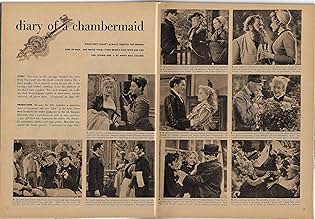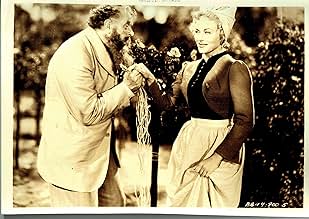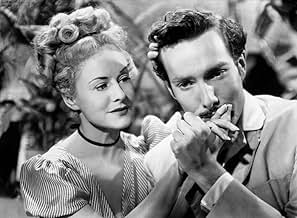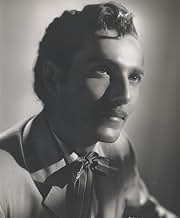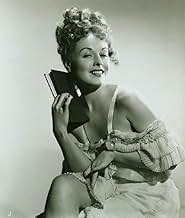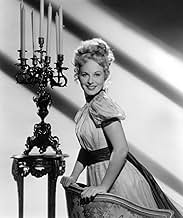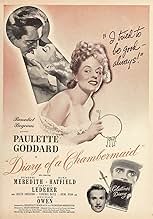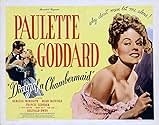IMDb RATING
6.5/10
1.6K
YOUR RATING
A chambermaid plots to climb the social ladder by marrying a wealthy man.A chambermaid plots to climb the social ladder by marrying a wealthy man.A chambermaid plots to climb the social ladder by marrying a wealthy man.
- Awards
- 1 win total
Edward Astran
- Townsman
- (uncredited)
Arthur Berkeley
- Townsman
- (uncredited)
Chet Brandenburg
- Townsman
- (uncredited)
Egon Brecher
- The Postman
- (uncredited)
Jane Crowley
- Townswoman
- (uncredited)
Sumner Getchell
- Pierre
- (uncredited)
Jack Perry
- Townsman
- (uncredited)
Joe Ploski
- Townsman
- (uncredited)
Featured reviews
Octave Mirbeau's brilliant, chilling novel was written more than 100 years ago, but its sordid, sexy, near-surrealistic mood and story could not possibly be given a worthy treatment in 1946, and certainly not in an America still subject to the Hays code. This film takes only some of the incidents in the episodic novel and tries to make the story into an eccentric romantic comedy. But, minus the mood and ambiance of the novel, the result is awkward and odd. An important aspect of the novel, anti-semitism (the book was written when France was torn apart by the Dreyfus case) is completely left out, and, instead of perversion and cruelty, Celestine experiences, from her employers, only annoyance. The performances are lightweight, except for Francis Lederer (always good at gentlemanly brutes) as the sinister valet. The film's only moments of horror occur when he indulges his talent, and taste, for discreet violence.
Nothing the great Renoir directed is without interest, and this Diary certainly has moments of beauty and affectionate comedy. But a much more accurate adaptation was Bunuel's in 1964. He left in the anti- semitism, and his own sexy-sadistic-surrealistic mood was a perfect match for Mirbeau's. One moment in this story reminded me of a similar incident, one of my favourites in a Bunuel film. The family for whom the chambermaid works lives next to a peppery, eccentric old man who demonstrates his loathing for his neighbours by throwing rocks through the panes of their greenhouse. In The Exterminating Angel, the partygoers are frightened when a brick is thrown through the window. The host calms them with "It's nothing. Just a passing Jew." Priceless!
Nothing the great Renoir directed is without interest, and this Diary certainly has moments of beauty and affectionate comedy. But a much more accurate adaptation was Bunuel's in 1964. He left in the anti- semitism, and his own sexy-sadistic-surrealistic mood was a perfect match for Mirbeau's. One moment in this story reminded me of a similar incident, one of my favourites in a Bunuel film. The family for whom the chambermaid works lives next to a peppery, eccentric old man who demonstrates his loathing for his neighbours by throwing rocks through the panes of their greenhouse. In The Exterminating Angel, the partygoers are frightened when a brick is thrown through the window. The host calms them with "It's nothing. Just a passing Jew." Priceless!
The Diary of a Chambermaid (1946) was directed by the great Jean Renoir. This is an U.S. film, although the action was set in France, and directed by a French director.
The movie is set in rural France in 1885. As the title suggests, a new chambermaid has arrived at a mansion of an eccentric couple. (Actually, almost everyone in the movie is eccentric to a greater or lesser degree.)
The person who's not eccentric, but totally evil, is the valet, Joseph. Francis Lederer portrayed Joseph, who is evil to the core. He looks like the villain that he is. (Actually, in one film. he played Count Dracula).
The reason to see is film is to watch Paulette Goddard at work. She was the classic Hollywood beauty of her time. And, 70 years later, she is still a classic Hollywood beauty. Better than that, she could act! Goddard plays Célestine, the chambermaid, whose only path out of lower-class drudgery is to marry a rich man. How this plays out is the plot of the film.
Renoir was possibly the greatest film director of the 20th Century. However, this movie is one of his minor films. Renoir does crowd scenes well, but he can't take his eyes off Goddard, and neither can we.
This movie has an anemic IMDB rating of 6.7. It's not a great film, but I think it's better than that. We saw it on DVD, and it worked well enough. Be sure to see it if you're a Renoir fan or a Goddard fan. Otherwise, I'd suggest Buñuel's 1964 version, with Jeanne Moreau.
The movie is set in rural France in 1885. As the title suggests, a new chambermaid has arrived at a mansion of an eccentric couple. (Actually, almost everyone in the movie is eccentric to a greater or lesser degree.)
The person who's not eccentric, but totally evil, is the valet, Joseph. Francis Lederer portrayed Joseph, who is evil to the core. He looks like the villain that he is. (Actually, in one film. he played Count Dracula).
The reason to see is film is to watch Paulette Goddard at work. She was the classic Hollywood beauty of her time. And, 70 years later, she is still a classic Hollywood beauty. Better than that, she could act! Goddard plays Célestine, the chambermaid, whose only path out of lower-class drudgery is to marry a rich man. How this plays out is the plot of the film.
Renoir was possibly the greatest film director of the 20th Century. However, this movie is one of his minor films. Renoir does crowd scenes well, but he can't take his eyes off Goddard, and neither can we.
This movie has an anemic IMDB rating of 6.7. It's not a great film, but I think it's better than that. We saw it on DVD, and it worked well enough. Be sure to see it if you're a Renoir fan or a Goddard fan. Otherwise, I'd suggest Buñuel's 1964 version, with Jeanne Moreau.
Chambermaid Paulette Goddard (Celestine) and the feeble, irritating Irene Ryan (Louise) arrive at the stately home in which they are to serve. They first meet the rather unpleasant valet, Frances Lederer (Joseph) before being introduced to Reginald Owen (Captain Lanlaire) and his wife Judith Anderson (Madame Lanlaire), who have an ill son, Hurd Hatfield (George). It becomes clear that it is Goddard's role to make his life better. Can she succeed....?
Paulette Goddard, Frances Lederer and Judith Anderson carry the film in terms of having a good cast but I'm afraid that's it. The film suffers by having too many buffoons - virtually everybody else. While Reginald Owen is OK as a bumbling old man, one is enough for any film. Unfortunately, we are also given Burgess Meredith as an extremely annoying old codger of a neighbour - he must be the most annoying character EVER. He constantly jumps and bounces around just like all old people do - you get my drift? He is so unconvincing that it's embarrassing. He is meant to be a likable, cheeky chappy. He isn't. Frances Lederer has a great moment with him towards the end of the film. Marvelous!
Frances Lederer keeps the tension ticking and is very watchable as the valet with something sinister going on in his head. The plot is good and keeps us watching as to how things will pan out for Goddard. Time to check the silverware.
Paulette Goddard, Frances Lederer and Judith Anderson carry the film in terms of having a good cast but I'm afraid that's it. The film suffers by having too many buffoons - virtually everybody else. While Reginald Owen is OK as a bumbling old man, one is enough for any film. Unfortunately, we are also given Burgess Meredith as an extremely annoying old codger of a neighbour - he must be the most annoying character EVER. He constantly jumps and bounces around just like all old people do - you get my drift? He is so unconvincing that it's embarrassing. He is meant to be a likable, cheeky chappy. He isn't. Frances Lederer has a great moment with him towards the end of the film. Marvelous!
Frances Lederer keeps the tension ticking and is very watchable as the valet with something sinister going on in his head. The plot is good and keeps us watching as to how things will pan out for Goddard. Time to check the silverware.
This film is not to be confused with the film by the same name which was made in 1964 by the famed director Luis Buñuel. While the theme of a conniving maid who is using her wiles to get ahead is in both and they have the same name, otherwise the films are very dissimilar--mostly because the bizarreness of Buñuel's version is missing. No foot fetishes, no rape, no murder and no antisemitism in the 1946 film! Jean Renoir's vision for the story is light-years different from Buñuel's. Personally, I think both versions have their strengths and both have their flaws, but I think the latter version is a bit better.
Paulette Goddard plays the title role. She is a conniving woman who comes to her new home as a maid in order to marry a rich man. She's mostly interested in the master's son--but the young man is an indifferent suitor at best (Hurd Hatfield). There's also the old and VERY wacky neighbor (Burgess Meredith) and the valet--played in a very creepy manner by Francis Lederer. Who will she get by the end of the film? And, unfortunately, who care? My biggest problem with this film is Goddard. I have long wondered why she got so many plum roles as she was only a fair actress--and here she often overplays her part. Any sort of subtlety is missing from her portrayal--and the role really needed this, as the woman SHOULD have been played like a master manipulator. As far as the direction goes, it wasn't bad--and had the nice look Jean Renoir was noted for in his films. But he probably should have reigned in a few of the more florid portrayals (not just Goddard's)--though Lederer was BRILLIANT and the best thing about the film. Also, Goddard's character was a bit too sympathetic--she should have been much more amoral and manipulative in order to make the movie more enjoyable. Overall, I prefer the 1964 version a bit more--though I think this film could use yet another remake--one that is more subtle and without the weird 'extras' Luis Buñuel put in his film that tended to distract the viewer. Worth seeing but nothing more--and it should have been better. A great script idea that should have been even better--and juicier.
FYI--Burgess Meredith and Paulette Goddard were married while they were making this film. Seeing Meredith wearing so much makeup and playing a very old man was rather funny--as they are almost the same age.
Paulette Goddard plays the title role. She is a conniving woman who comes to her new home as a maid in order to marry a rich man. She's mostly interested in the master's son--but the young man is an indifferent suitor at best (Hurd Hatfield). There's also the old and VERY wacky neighbor (Burgess Meredith) and the valet--played in a very creepy manner by Francis Lederer. Who will she get by the end of the film? And, unfortunately, who care? My biggest problem with this film is Goddard. I have long wondered why she got so many plum roles as she was only a fair actress--and here she often overplays her part. Any sort of subtlety is missing from her portrayal--and the role really needed this, as the woman SHOULD have been played like a master manipulator. As far as the direction goes, it wasn't bad--and had the nice look Jean Renoir was noted for in his films. But he probably should have reigned in a few of the more florid portrayals (not just Goddard's)--though Lederer was BRILLIANT and the best thing about the film. Also, Goddard's character was a bit too sympathetic--she should have been much more amoral and manipulative in order to make the movie more enjoyable. Overall, I prefer the 1964 version a bit more--though I think this film could use yet another remake--one that is more subtle and without the weird 'extras' Luis Buñuel put in his film that tended to distract the viewer. Worth seeing but nothing more--and it should have been better. A great script idea that should have been even better--and juicier.
FYI--Burgess Meredith and Paulette Goddard were married while they were making this film. Seeing Meredith wearing so much makeup and playing a very old man was rather funny--as they are almost the same age.
As Paulette Goddard plies her "magic," things don't always go as planned. She is a gold digger and doesn't hesitate to settle for less attractive if there is money on the way. What happens is a series of abutments that hold up the process. For me the charm of he movie was the use of some great character actors. A young Burgess Meredith and Irene Ryan. It's one of those films that is ultimately forgettable but has some nice moments.
Did you know
- TriviaOctave Mirbeau's 1905 novel caused a sensation in France and was widely condemned by censorship bodies. This film makes several alterations to the plot, making the wealthy Lanlaire family more eccentric than kinky and bringing the child-murderer to justice at the end.
- GoofsWhen the Captain (Meredith) is going to the July 14 celebration, the shadow of the boom and mic are visible.
- Quotes
Georges Lanlaire: I never found the urge to live or die on a big scale.
- ConnectionsReferenced in Tiovivo c. 1950 (2004)
- How long is The Diary of a Chambermaid?Powered by Alexa
Details
- Release date
- Country of origin
- Language
- Also known as
- The Diary of a Chambermaid
- Production companies
- See more company credits at IMDbPro
- Runtime
- 1h 26m(86 min)
- Color
- Aspect ratio
- 1.37 : 1
Contribute to this page
Suggest an edit or add missing content

